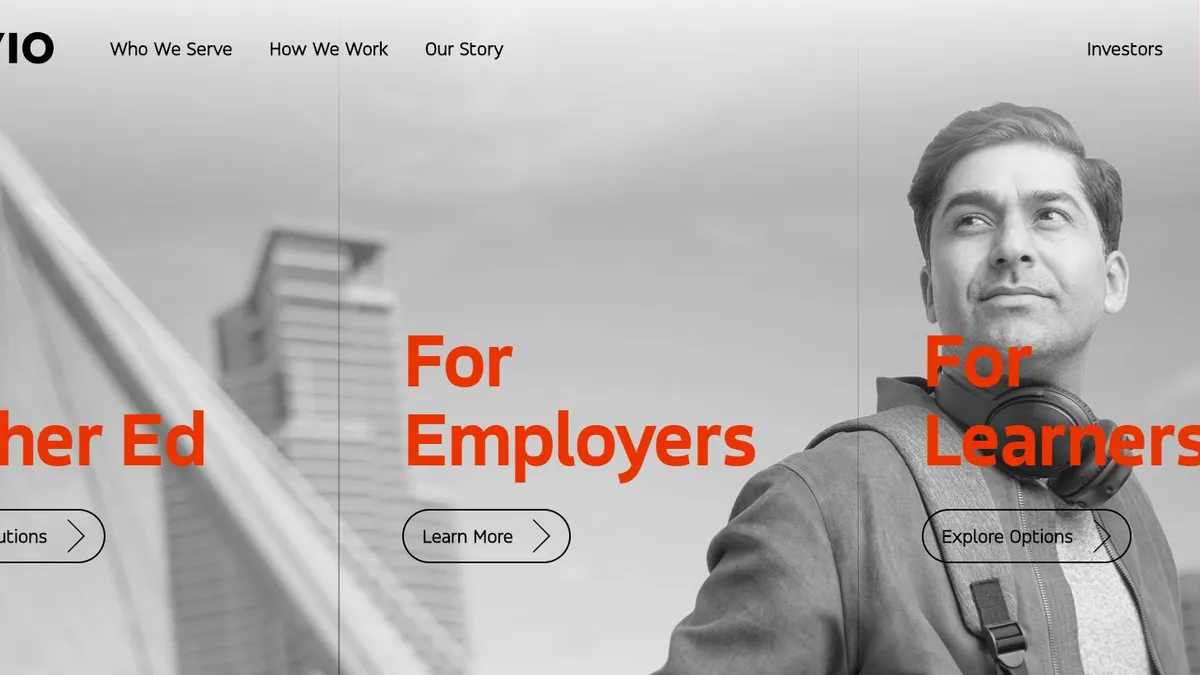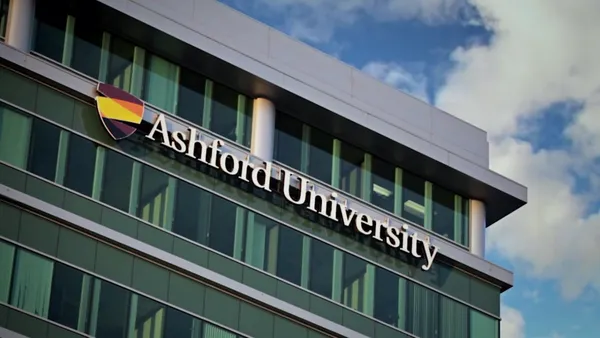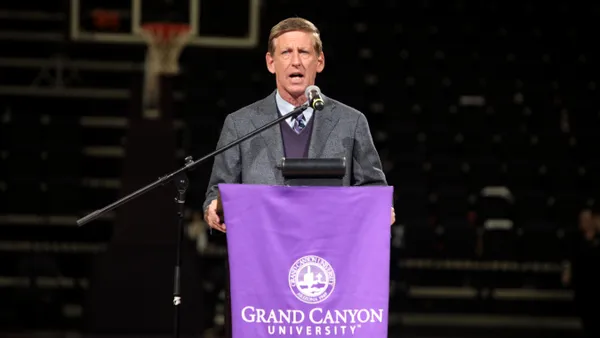Dive Brief:
- Zovio is moving forward with plans to separate its Ashford University as a standalone nonprofit public benefit corporation, company executives told analysts on a call Tuesday morning. It hopes to close the transaction by June 1.
- The company agreed to pay $1 to the nonprofit entity that was set up to own and operate the university in exchange for being reimbursed for the educational technology and business services it will provide. It will also take a 19.5% cut of revenue from tuition and fees.
- Zovio previously said it was considering a variety of options for Ashford, including selling it to another institution while providing certain ed tech services.
Dive Insight:
Zovio expects to provide Ashford services such as recruiting, student finance and financial aid advising, student program and retention advising, as well as information technology and academic support under the new arrangement, according to documents filed with the Securities and Exchange Commission this week.
The deal is similar to one finalized in early 2018 between Purdue University and Kaplan University, which was intentional, Zovio CEO Andrew Clark told analysts.
"We looked at various models that were out there in conversions and sales and we really felt the Purdue-Kaplan approach was probably one of the better approaches ... and we wanted to try and model that as often as we possibly could,” Clark said.
During the first 10 years of the proposed 15-year agreement, Ashford will have the option of paying less than it would otherwise owe Zovio for the services provided in order to achieve a composite score of 1.6 with the U.S. Department of Education and an operating margin of 1.5%. However, Ashford would be expected to make up the difference in payments in years when it exceeds the two benchmark figures. The composite score is a key measure of fiscal responsibility used by the department to determine eligibility for Title IV funding.
Under the agreement, Ashford would receive a one-time payment from Zovio of up to $15 million in the first year. The pair could renegotiate the agreement after 10 years. Ashford could also end the relationship at that point, though doing so would require it to return 125% of the fees paid in the prior 12 months. Either party could break the contract under certain conditions without penalty, including if Ashford posts annual operating cash losses of $10 million or more for three straight fiscal years.
Zovio is also planning to obtain a $103 million senior secured term loan facility to finance a letter of credit the Ed Department requires for the deal. The sum is roughly equivalent to 25% of the Title IV funding Ashford University received in 2018. The department notified Zovio of the requirement last summer in its abbreviated preacquisition review of the transaction.
The letter of credit must continue until Ashford can put forward two years of "acceptable" compliance audits for two full fiscal years following the ownership change, an Ed Department spokesperson told Education Dive in an email Tuesday.
At the end of its latest financial quarter, Sept. 30, the company had $79 million in cash, around half of what it had going into the year. That quarter it pulled in revenue of $104 million, compared with $113 million a year earlier.
While its accreditor, the WASC Senior College and University Commission, has approved the spinoff, it did so with the caveat that Ashford's officers and related parties divest of their financial and ownership interests in Zovio. A spokesperson for the accreditor told Education Dive in an email Tuesday that Ashford "is in regular contact with the Commission via its staff liaison and ... we know they are working on this requirement." The IRS also signed off on the move.
The Ed Department, however, will conduct a full analysis of the change in ownership before determining whether Ashford will be considered a nonprofit entity for the purposes of accessing Title IV funding, the spokesperson said.
Zovio entered 2019 under its old banner, Bridgepoint Education. In the last year, it rebranded, hired new execs, cut positions and acquired companies that expand its offerings in areas such as skills training and online tutoring. While Zovio considered selling Ashford, executives have maintained that option was an alternative to the long-term plan to separate the institution as a standalone nonprofit.
Speaking with analysts Tuesday, Clark pointed to heightened regulation of the for-profit sector and what he called "false allegations" targeting it as a reason for the spinoff. For its part, Zovio, under the Bridgepoint name, was sued over allegations it misled students, claims it denies. It is one of several for-profit college operators to face legal challenges over claims of misrepresenting their programs to students.
It's also not the only college operator looking for an exit from the for-profit sector. Grand Canyon Education learned in November that the Ed Department would not recognize Grand Canyon University as a nonprofit institution for the purposes of Title IV funding.
Whereas Zovio learned of the Ed Department's expectations before moving forward, Grand Canyon Education received the formal response to its request for a preacquisition review 16 months after separating the university. The company has said it plans to contest the decision.














